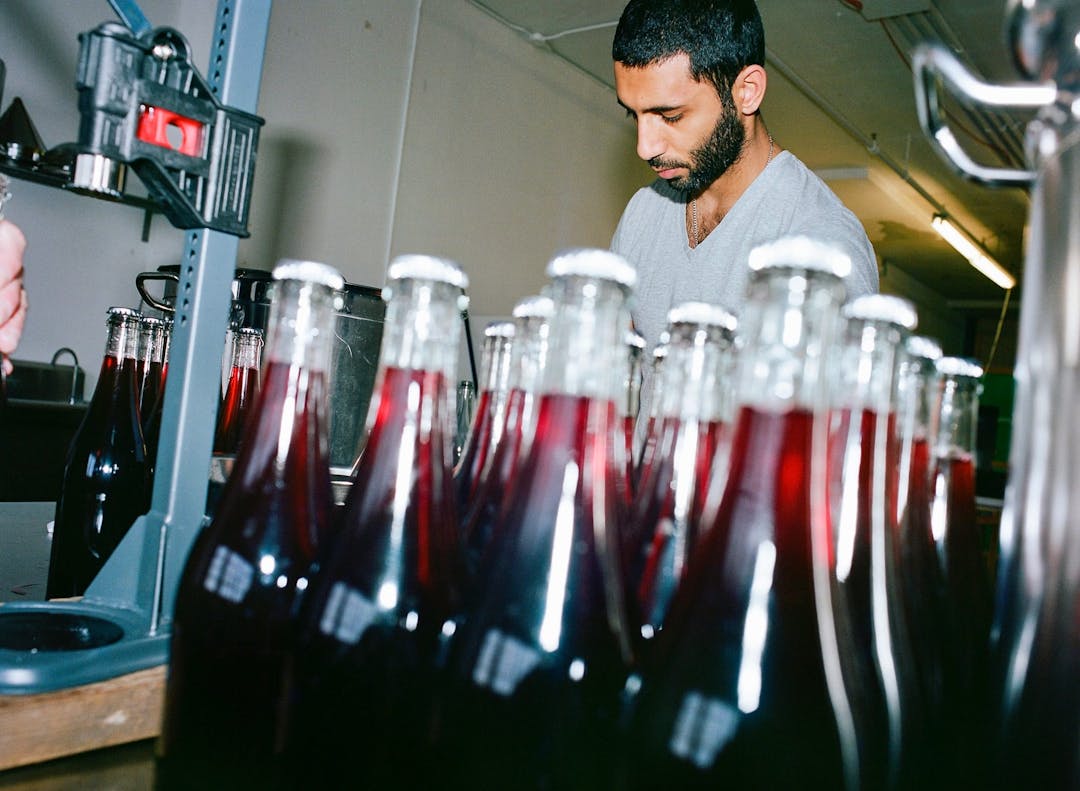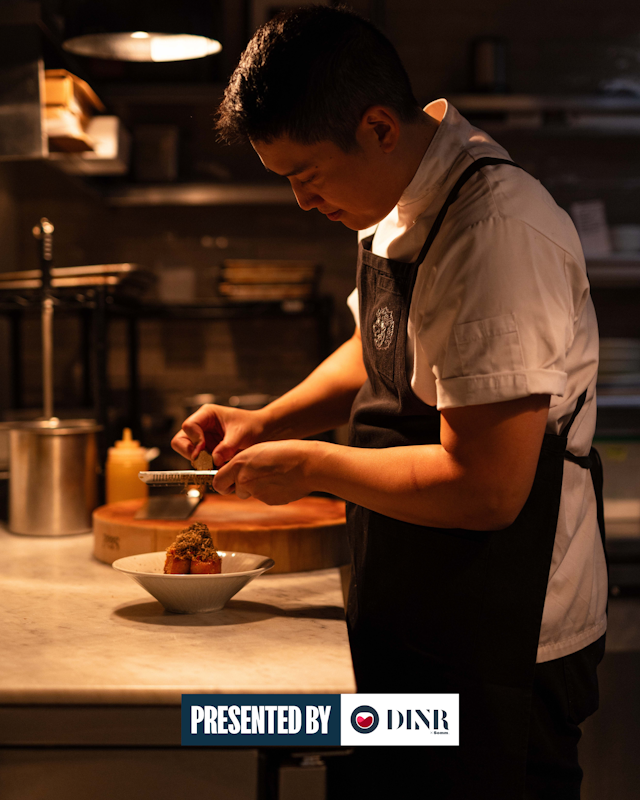Deep in the juice with Zamalek: Blending Egyptian karkadé tea with Mile End culture
How the Mile End scene of the twenty-tens and Egyptian heritage brewed a drink Montreal today couldn't do without.
The creation of the hibiscus juice company Zamalek feels so purely Montreal: Starting on the stovetop of a local cook and DJ’s apartment via a recipe handed down from a mother with transatlantic roots, and becoming an artisanal idea brewed in 2020 between three friends connected by the city’s culture and their own friendship in the Mile End.
Today, its team of Jules Leuba, Damarice de Richoufftz and Bashar Odeh have turned an organic and fair trade recipe for cold infusion Egyptian karkadé tea made simply with hibiscus, turbinado sugar, and spearmint into something that’s gone from 2,000 to as much as 120,000 cans in three years.


Jules Leuba, Damarice de Richoufftz and Bashar Odeh of Zamalek (left), and the drink that started it all (right). | Photograph: Maximilien Bottge & Henry Acteson
There’s definitely something about Montreal and our world, what revolves around Zamalek, that’s very energizing. It feels like we’re surrounded by many people who do many things—entrepreneurs and artists that start their own things—and it’s very thrilling.
True to roots
Named after the Zamalek district of Cairo and the Egyptian soccer team, the drink bridges the idea of heritage with its founders with their own present-day community.
“I think for Jules as an Armenian and my brief meetings with Damarice’s family, the concept of roots is very important within our team,” says Bashar.
“In Arabic culture, especially as a Palestinian, forgetting your roots is a big no-no. My father, on my first trip to start school in Canada, heavily emphasized the importance of not forgetting where your tree started its roots—which for me was in Egypt, Palestine and Jordan—and I think that’s what drives a lot of the value-based decision-making within Zamalek.”


A young Bashar in Egypt, sometime in the 90s. | Photograph: Courtesy Zamalek



Jules' family in Cairo around the 80s. | Courtesy: Zamalek
Damarice stresses that between the familial connections of Bashar and Jules that they bonded over, it’s still unreal that Egyptian communities are proud and amazed that Montrealers are enjoying one of their traditions, especially one named after a key district and soccer team.
But then there’s the city where they met and began Zamalek in the first place.
“There’s definitely something about Montreal and our world, what revolves around Zamalek, that’s very energizing. It feels like we’re surrounded by many people who do many things—entrepreneurs and artists that start their own things—and it’s very thrilling.”
“People ask me why I stayed in Montreal, and what’s happening here? It’s very exciting.”

In the juice
“It’s hard for all of us to remember the day we decided to be partners,” says Jules. “It all started naturally.”
The Swiss-born Jules was making hibiscus juice in his kitchen and selling it to local businesses like Pumpui and La Rama Records four years back. Originally coming to Montreal via dual citizenship from his father, it was the restaurant industry that kept him here, starting with work at Patati Patata and DJ gigs at an underground afterparty spot known as The Fall (among others).
“After high school in Geneva, I was a bike messenger and didn’t find my way in any classic curriculum, and it’s hard to survive like that in Europe. Back in 2013, Montreal was perfect for that. Rents were cheap, there was work—it was fun,” Jules says.
“When I moved to Montreal, I always loved to cook, and it was when I started to discover cooking outside of my parents. I thought ‘oh yeah, I can make that juice,’ and it started with roommates I was with who liked it,” he adds.
Jules Makes Juice from Henry Acteson on Vimeo.
“I worked at Patati Patata for four years, throwing all my energy in, and was DJing and discovering the music around the city.”
That’s how he met Bashar, a Palestinian-Egyptian Montrealer who was a regular at the casse-croûte.
“I met Jules at Patati Patata, then went to see him play a few gigs, but the real catalyst (for starting Zamalek) was an Instagram story of him on a little scooter in Egypt, and me messaging to ask if he was in Egypt as I had recognized the scenery,” Bashar recounts.
As for what drew Bashar to Jules?
“Good question,” he laughs. “The Egypt moment for sure, and I also think initially it was curiosity. I get genuinely interested in people and trying to understand them on a deeper level. I like people who wander off the beaten path, and Jules definitely fit the bill.”
During this time, Damarice came from living in between France and Switzerland to Montreal in 2017 to study at UQAM. “I started discovering Montreal through different circles—a student who was into bikes and partying, I guess—and I met Jules in 2019 at Nuit Blanche,” she recalls.
“I started going to La Rama, he started telling me about hibiscus… and I thought it was nice to elevate a plant that’s grown in so many cultures around the world that everybody knows about.”


Bashar and Jules at Kahéra (left) and Bashar and Damarice kicking back (right). | Photograph: Courtesy Zamalek
Zamalek is a way of doing things at this point. It’s not taking the easy way out, it’s supporting what you value even if it's not the best business move. It’s about creating something bigger than its constituents, bringing out the best in each other.
...and then getting deep in the karkadé
The group eventually began their first meetings to form Zamalek at Olimpico in the Mile End, taking influence from the neighbourhood’s artistic community that they felt a part of—all basing an idea on a then-hobby of Jules’. Jules had never thought of starting a business—if anything, he thought he could go on forever as a cook at restaurants along Saint-Laurent Boulevard, DJing, and working the counter at La Rama Records.
“It was a blend of intuition and pragmatism for me,” Bashar recounts. “I didn’t see it so much as taking a big risk since whether it worked out or not, the learning along the way was infinitely more valuable. Trust is good, but also looking at things (as) a win either way helped alleviate any anxiety around failing.”
All sharing a complimentary vision, the company was built slowly, brick by brick. The pandemic’s slow movement allowed the three founders to go at their own pace, and now, it represents a form of freedom for the trio.
“Zamalek is a way of doing things at this point. It’s not taking the easy way out, it’s supporting what you value even if it's not the best business move. It’s about creating something bigger than its constituents, bringing out the best in each other,” Bashar says.
There’s freedom in drinking it as well. An easy project for the zero-proof community, it can also be mixed into a lot of white liquors—vodkas, gins, rum, some types of mezcal even—as well as more complex cocktails as it’s made from real flowers and low amount of sugars where it becomes a light compliment to a recipe. Even the new wave French bistro Salle Climatisée made a panna cotta with it at one point.


Damarice de Richoufftz, Bashar Odeh, and Jules Leuba of Zamalek (left). | Photograph: Maximilien Bottega & Caroline Mulock
We’re not in a rush and looking to make millions overnight. That was never the plan. We do things the way we like, and we stick to our values.
Keeping it real, keeping it Montreal
"I think the realness of the drink is something we like to keep. We started with nothing,” Jules explains, “and the way we make the drink? Like the way Damarice handled marketing and communications? We never wanted to overdo things: Keep real ingredients, keep low but real sugar, and not pay for overexposure and marketing.”
“We’re not in a rush and looking to make millions overnight. That was never the plan. We do things the way we like, and we stick to our values. We’ve also changed our minds over time of course—when we started we were a bit utopic, selling to our circle of friends—but (growth) came organically.”
The only real challenge now is keeping those original values intact.
“If you start digging into companies (like ours), there’s a story and not just a business opportunity,” says Damarice.
“I think people really see that in us, and it’s something I’m going to struggle with keeping if we expand to the rest of Canada and elsewhere. It works so well in Montreal as all these businesses that supported us in the beginning we see on a daily basis—we have them over for dinner, we share things in commonؙ—and there’s all of this curating of friendships and partnerships if we export (ourselves) out of Montreal,” she says.







![The Best New Restaurants in Montreal [April 2025]](/_next/image?url=https%3A%2F%2Fthemain.ghost.io%2Fcontent%2Fimages%2F2025%2F04%2F021030890026.jpg&w=640&q=75)

